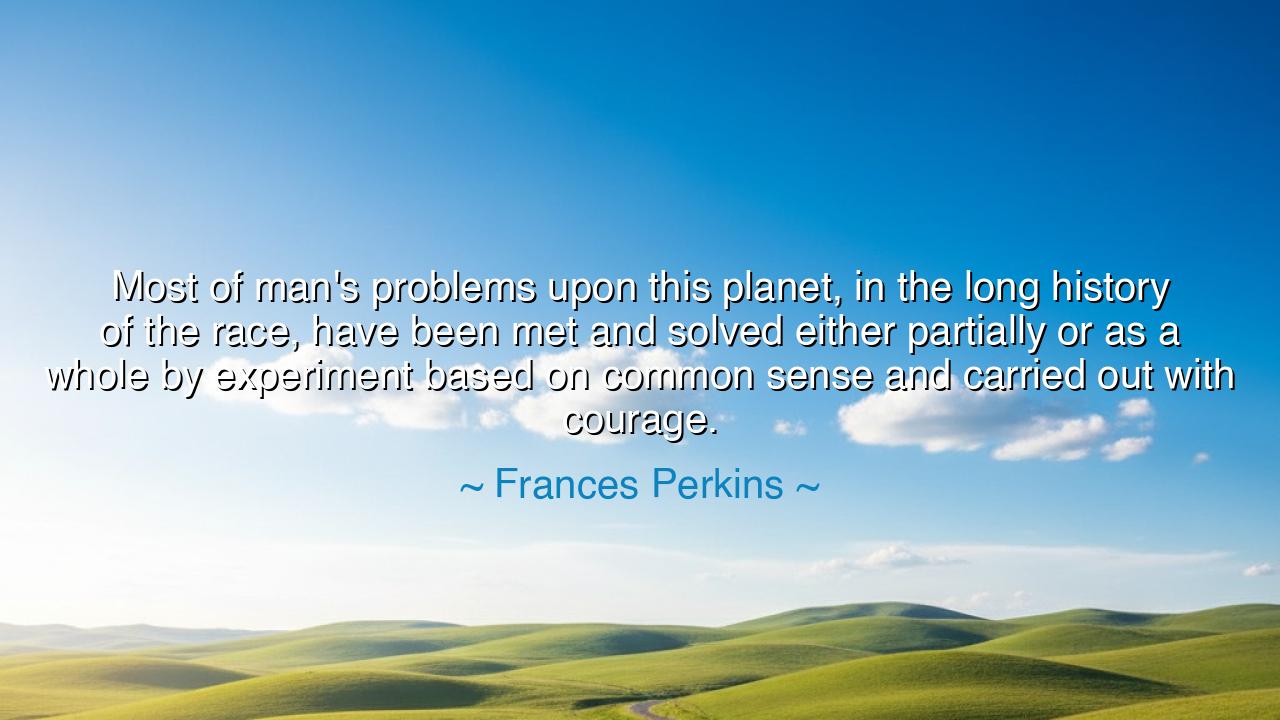
Most of man's problems upon this planet, in the long history of
Most of man's problems upon this planet, in the long history of the race, have been met and solved either partially or as a whole by experiment based on common sense and carried out with courage.






“Most of man’s problems upon this planet, in the long history of the race, have been met and solved either partially or as a whole by experiment based on common sense and carried out with courage.” Thus spoke Frances Perkins, the great American reformer and the first woman ever to serve in a presidential cabinet. Her words carry the weight of both reason and conviction — a declaration born not in philosophy alone, but in the furnace of real struggle. In this single sentence, she reveals a timeless truth: that human progress depends not upon miracles, nor upon mere hope, but upon the union of common sense, courage, and the willingness to experiment — to try, fail, and try again in pursuit of what is just and true.
The origin of this quote lies in Perkins’s long service as Secretary of Labor under President Franklin D. Roosevelt, during the dark days of the Great Depression. The nation was broken, millions were jobless, and despair hung over the land. In that hour of crisis, it was not theory that saved America, but experiment — the bold willingness to test new ideas, guided by practical wisdom and moral conviction. The New Deal, which reshaped the social and economic foundations of the United States, was not a perfect plan born whole from a scholar’s desk; it was a living experiment, built from trial, error, and courage. Perkins herself was the mind behind some of its greatest triumphs — the Social Security Act, the minimum wage, and the right to safe working conditions. She knew from experience that progress is never a gift bestowed from above; it is a labor of those who dare to act with courage and common sense when all others stand frozen in fear.
In her words, experiment is not mere scientific curiosity — it is the spirit of practical creation, the act of applying reason to the world. Common sense, to Perkins, is not simplicity, but clarity — the ability to see what must be done, without being blinded by ideology or pride. And courage is the force that moves the hand to act upon that vision. Without common sense, our experiments are reckless; without courage, they are never begun. History’s great turning points were not achieved by those who waited for certainty, but by those who acted with wisdom enough to begin despite uncertainty.
Consider the story of Thomas Edison, the inventor who gave the world the electric light. His success was not a flash of genius, but a victory of perseverance — an experiment repeated over a thousand times before bearing fruit. When asked about his failures, he replied, “I have not failed. I’ve just found ten thousand ways that won’t work.” In him we see the spirit Frances Perkins spoke of: the blending of common sense — the understanding that persistence, not perfection, brings progress — and courage, the strength to continue in the face of doubt and ridicule. Edison’s triumph was not only technological but philosophical, proving that experiment, when guided by steady reason and brave heart, can illuminate even the darkest world.
And yet, this wisdom does not belong only to inventors and leaders; it belongs to every human soul. Each of us faces the problems of life — of love, of duty, of hardship — and each must confront them in the same way humanity always has: through experiment. We stumble, we adjust, we learn. The one who waits for perfect conditions will never move; but the one who acts with thoughtful courage, testing and refining their path, will find progress even in failure. To live is to experiment — to learn by doing, to risk with reason, to trust in the strength of one’s spirit to endure what must be endured.
Frances Perkins spoke not only of human progress, but of the moral duty that lies within it. To her, courage was not the reckless valor of warriors, but the quiet strength of those who work for the common good despite opposition. Her common sense was not cynicism, but compassion grounded in practicality — the belief that society could be both humane and efficient. And her call to experiment was an invitation to every generation: to face the problems of their time not with despair, but with action born of thought. She knew that fear of failure is the greatest enemy of civilization, for it is fear that leaves injustice unchallenged and potential unrealized.
Therefore, my children, let her words be carved into the stone of your hearts: “We must exercise ourselves in the things which bring happiness,” said Epicurus long ago; and Frances Perkins, in her own age, told us how to do it — through common sense, courage, and experiment. Do not wait for perfect knowledge or divine signs to guide your hand. Begin. Test. Learn. Correct. Try again. Whether in your personal life, your work, or your service to others, act with reason and bravery. For no progress has ever been made by those who only dream; it is made by those who dare to act.
And remember this eternal lesson: human progress is not born of perfection, but of perseverance. The world you inherit will not be made better by fear or by wishful thinking, but by your willingness to experiment wisely, guided by the twin lights of common sense and courage. Let your life itself be an experiment — noble, thoughtful, and brave — and you will become, as Frances Perkins was, a maker of solutions, a servant of progress, and a keeper of the flame of hope that never dies.






AAdministratorAdministrator
Welcome, honored guests. Please leave a comment, we will respond soon